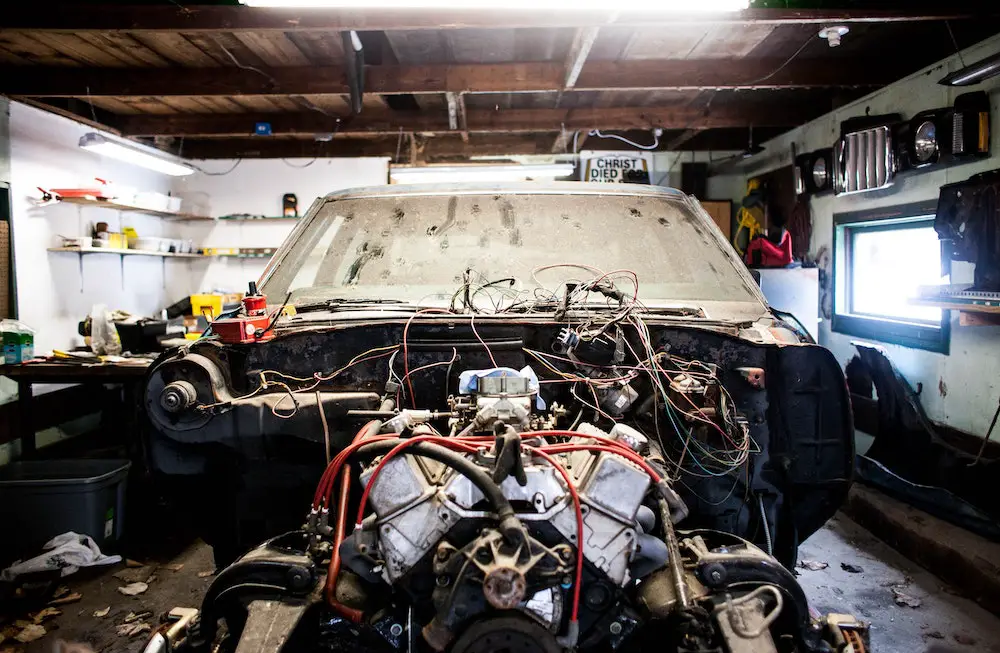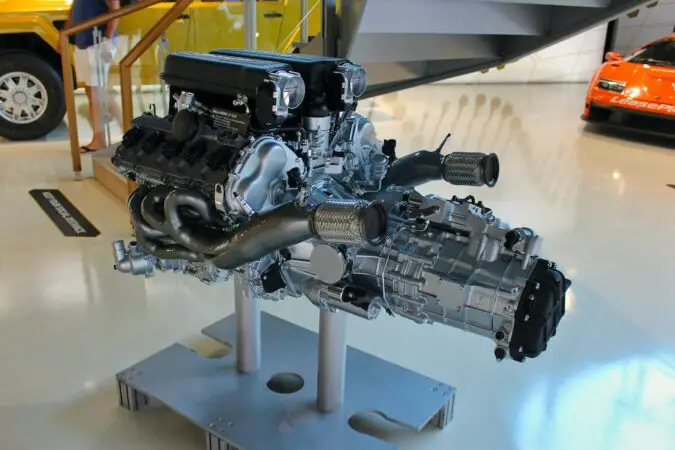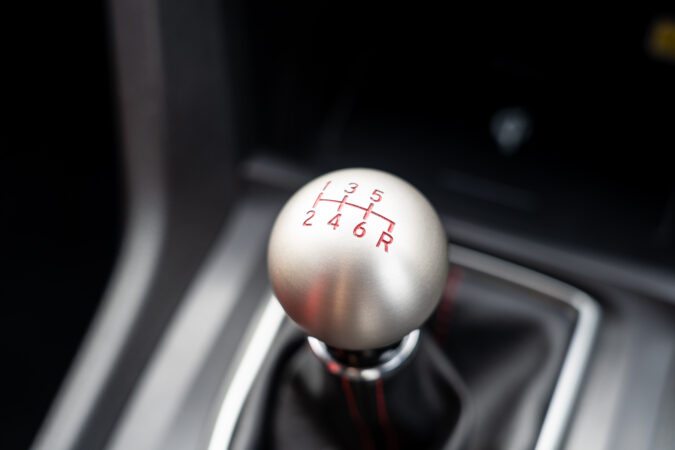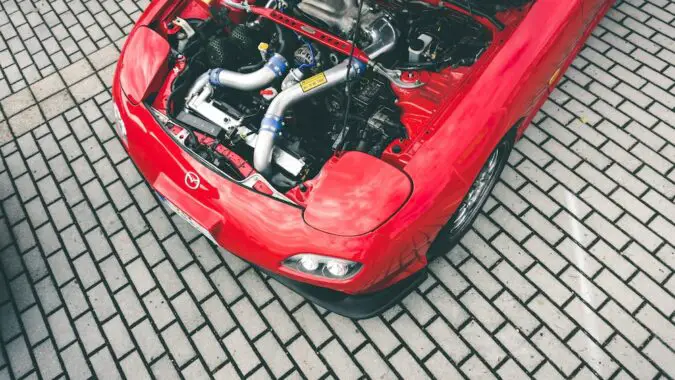How much does an engine swap cost? Let’s get this out of the way: an engine swap is a costly endeavor that costs thousands of dollars. Whether you want it because your old motor is dead or you want something with more power, it’s a costly and labor-intensive process. Here’s the engine swap cost and everything else you need to know:
What’s An Engine Swap?
Just to make it clear, an engine swap is the term car enthusiasts use when they want to put a different engine in their car to give it more power. So, they’re swapping their current engine with a different one that wasn’t originally intended for their car.
If you’re replacing your original engine with a new one it’s but it’s an identical engine, then you’re doing an engine replacement. This is usually done to replace an old engine that has extensive internal damage or wear and can no longer run without major repairs. Sometimes, replacing it entirely may be cheaper than repairing it.
The terms “engine swap” and “engine replacement” are interchangeable. But this post will mostly focus on engine swaps as means to put more power in your car. If you’re looking to replace your current engine with an identical one because the original one died, we recommend checking our engine replacement cost article.
Is It Legal?
The law varies by state, and California has some of the strictest laws regarding engine swaps. You’ll need to check with your local DMV on what the regulations are in your state. But as a rough guide, here’s how an engine swap can be legal:
- The engine has to be the same year or newer than your car’s model year. For example, if your car is a 2000 model year, then you can’t fit an engine from before the year 2000.
- The engine has to be from the same class of vehicle. So, you can’t fit a truck engine in a car or vice versa.
- The engine has to retain its emissions equipment such as the Exhaust Gas Recirculation (EGR) system and the catalytic converters. Without this, you won’t be able to pass the emissions test and your car can’t be road-worthy.
Again, you should check with your local DMV for the exact regulations. Some states are more lenient, while others are very strict and won’t allow certain things, such as fitting an engine from a different manufacturer.
Engine Swap Cost Factors
So here’s the thing, we can’t give you an exact quote on how much you’ll be spending. There are a lot of factors that affect the cost of an engine swap:
1. Cost Of The Engine
Needless to say, the cost of the engine itself will affect the total engine swap cost greatly. When swapping an engine, you have three options: remanufactured, crate, or used engines.
A remanufactured engine is an engine that has been restored with new parts and to factory specifications as close as possible. The process entails machining the engine block, cylinder heads, and other structural parts to their former glory. Then replacing the internal parts such as the pistons, valves, and camshafts amongst others.
Of course, this is going to be expensive. Restoring an engine to its former glory requires time, skill, and expensive tools. Remanufactured engines typically cost between $2,500 – $4,500 depending on the engine type. In some cases, it may be less, but keep in mind that this doesn’t include the labor cost of installing the engine.
Crate engines are similar to remanufactured ones. However, a crate engine is a term for a brand new engine – usually muscle car engines – delivered to you on a crate. They cost anywhere between $4,500 – $18,000 depending on what type of engine it is.
Meanwhile, used engines are much cheaper. There are companies specializing in selling used engines, or sometimes you can find them at scrapyards as well. These engines come from scrapped cars that still had the engine intact. A used engine at the scrapyard is anywhere between $400 – $700, but desirable ones in good condition (such as a Chevy LS1 engine for example) can cost upwards of $1,500.
While cheaper, the downside is of course there’s no guarantee that the engine even works. Even if it does, you have no idea how many miles it’s done and the condition of its internals.
2. Labor Cost
The next cost factor is of course labor. The total labor cost will depend on how long it takes to swap the engine in your car. On average, it takes about 15 – 20 hours to swap a car engine. Meanwhile, labor rates at auto repair shops are now around $75 – $130.
The best-case scenario is that it will take a swift 15 hours to swap your engine, and the labor rate at the shop is a nice round $100. This brings your total engine swap labor cost to $1,500. Not including the cost of the engine, mind you. Of course, that’s the best-case scenario. Don’t be surprised if the bill comes to $2,000 or more.
3. Transmission Cost
If you’re putting in the same engine as your car currently has, then you don’t need to worry about this. However, if you’re putting in a different engine, say a Chevy LS engine in a Nissan, then you’re going to have to think about the transmission as well. Chances are, the original transmission won’t work with the new engine.
We won’t get into the details why, but there are bound to be compatibility issues when mating an engine and transmission from different manufacturers.
Even if they work together, there’s a large chance that your standard transmission can’t handle the newfound power from your new, more powerful engine. Leading to a broken transmission sooner rather than later.
This means not only do you need to buy an engine, but you’ll also need to buy a transmission as well. Much like engines, you can buy either remanufactured or used transmissions. Remanufactured ones are between $1,300 to $3,400. Meanwhile, used ones are between $500 to $1,200 but often in less than ideal condition.
4. Other Parts And Fabrication Cost
Outside of the engine and transmission, there are other parts that you need to consider as well. This includes the fuel system, transmission and engine mountings, exhaust system, air-conditioning, and coolant pump amongst others. Of course, if you’re swapping with the same engine that your car currently has, you can probably reuse the current parts.
However, if you’re swapping to a different engine, you need to consider the cost for these parts as well – if they’re not included with the engine that you bought. Additionally, some fabrication and custom parts may be required when you’re swapping an engine.
For example, a different engine may require you to modify the mounting brackets. Or maybe it will require you to modify the brake lines to fit with the engine. These custom parts will add to the total cost and they are not cheap. We can’t say how much this will exactly cost as it depends on how many parts you have lying around to reuse for your engine swap.
Engine Swap Cost: Bottom Line
The bottom line is that the cost will vary depending on the factors we mentioned above. To give you a rough idea, the most basic swap with no modifications done and a used engine will cost between $1,500 – $4,500.
Meanwhile, a swap with a new engine and brand new parts will cost anywhere from $6,000 – $25,000. The cost depends on what car you have, what engine you’re working with, and how extensive the overall modification is.
There’s an old saying for an engine swap project: whatever your expected budget is, triple it. That way you might not go over budget.
Engine Swap Cost: Is It Worth It?
The answer to this depends entirely on you, your financial situation, and how much money you’re willing to spend on your money pit that is your car. Here are the pros and cons to help you decide:
Pros Of An Engine Swap
There are three main benefits to swapping an engine:
- You can get more power if you swap it with a more powerful engine. Of course, you can tune your original engine to get more power. However, you can get at best an additional 10 – 70 horsepower before you need to start messing around with internal engine parts – which are equally as expensive.
- A wider range of aftermarket parts options. Some stock engines don’t have a wide range of aftermarket parts available. Meanwhile, some popular swap engines such as Toyota’s 2JZ, Honda’s K-Series, and Chevy LS engines have a much wider range of options and you can modify them to your heart’s content.
- You can have a more reliable engine – provided that you do the swap properly and you get a good engine for the swap.
Cons Of An Engine Swap
On the other side of the argument, here are the reasons not to do an engine swap:
- It’s monumentally expensive, especially if you want to do it properly with a new engine. Not to mention the cost of the transmission and additional parts.
- It takes time, so your car will be out of service for some time. While some engine swaps take 20 hours at most, a more complex swap and build will take weeks or even months to finish.
- You may need to re-register your car, which costs more money and time. Not to mention the emissions testing as well. If your car doesn’t pass, you’re going to have a bad time.
Our advice? We would only do engine swaps when we have a certain vision in mind for our car that we really want to execute. For example, I would love to do a Toyota GT86 with a 2JZ-GTE engine. This is already a common build, but I would love to make it my own.
The GT86 is a wonderful car in its own right, but I can’t help but think that maybe a straight-six engine like the 2JZ would make it even better.
If you don’t have this kind of vision, we don’t recommend it. An engine swap costs money and time, and if you don’t have the determination and passion to make bring this vision to reality, you’re going to regret taking on the project.
Engine Swap Examples
Since engine swap cost varies greatly, we think it’ll be a good idea to give you some examples so you get a better idea of how much this project will cost. Here are some of our favorite examples:
1. Honda Civic EK K-Series Engine Swap
This is quite common and probably one of the simpler builds because you’re swapping the original engine with another engine from the same manufacturer. This doesn’t mean that it’s a simple bolt-on job, but it’s usually more straightforward and sometimes cheaper.
Older Civics come with either a D or B-Series engine. These engines are great, but the K-Series is the engine used by larger and performant Honda models. It has more base horsepower and more modification potential.
We recommend watching the video above. While the entire build of the car costs upwards of $23,000, the cost of the engine swap itself was much cheaper. It’ll give you a good idea of how costs can add up in an engine swap job.
Looking at Honda forums, this engine swap job typically costs between $7,000 – $11,000 if you want to do it properly with brand new parts. Of course, it can be much lower if you do it with a used engine and cheaper parts.
The other good news is that this type of engine swap is very common hence many companies make swap kits. These kits are like crate engines and make the process easier – sometimes cheaper. In the case of Hondas, one such company is K-Tuned.
2. Nissan 350Z LS3 Swap
As mentioned, the Chevy LS engines are very popular for engine swap projects. Mostly because they’re reliable and the engine block is so strong that it can handle up to 1,000 horsepower. Making it the perfect choice for those who want a powerful and durable engine in their car.
LS engine can be put in many cars, including the Toyota GT86, Mazda RX-7, Nissan 240SX, and the Nissan 350Z amongst others. However, since the engine and the car are from different manufacturers, you can imagine how this can get expensive quickly.
Fitting an engine from a different manufacturer like this will require you to buy additional parts to make the engine work, including some custom parts. Some of these parts include the engine and transmission mounts, the transmission itself, a fuel pump, new wiring for the car, and more.
A swap like this will cost at least $10,000 for a decent build. You might be able to swap it for cheaper, provided that you buy a used engine and other parts as well.
3. Uncharted Territory: The Toyota GT4586
Remember the 2JZ-swap Toyota GT86 that I wanted? That is by no means an easy build, but it seems like an unambitious dream when you compare it with a GT86 with an engine from a Ferrari 458.
If you keep up with tuning culture and the drift scene, in particular, you might remember this GT86 drift car owned by Ryan Tuerck and built by Huddy MotorSports. Yes, it has a Ferrari 458 engine up front, hence the name GT4586. Doesn’t sound cool, but clever nonetheless.
This is the most expensive kind of engine swap that you can do. Not just because of the expensive engine, but because this is an experimental engine swap that hasn’t been done before.
The other two aforementioned swaps are well-documented and have been done numerous times before. So, we know it’s possible, and there are swap kits that you can buy to make the process easier.
However, this GT4586 build has never been done before. This means the engineers would have to figure out the mounting, the wiring, and plenty of other things on their own to fit the engine in the car. As you can imagine, this sort of build isn’t cheap.
Ryan Tuerck was hesitant in giving the exact numbers, but the engine itself was $42,000, to begin with. We imagine the fabrication, testing, and custom parts also significantly add to the cost.
Of course, this is probably a swap that we mere mortals won’t ever do in our lifetime. But it goes to show these kinds of engine swaps are possible, albeit at a very high price. Quick shoutout to the BMW E30 M3 V10-swap that I think is equally as insane as this GT86.
Engine Swap Cost: Questions & Answers
Do you still have questions about the engine swap? Your answer might be just down here:
Can I Do An Engine Swap Myself?
Technically yes, but we wouldn’t recommend it. On a 1 – 10 difficulty scale, swapping an engine is a solid 10. You can’t do this without advanced engineering knowledge and the right tool. Even if you have good mechanical knowledge, wiring a new engine is often a nightmare to figure out.
If you’re willing to spend weeks swapping an engine, then go ahead. But we don’t recommend doing it yourself to save money. It’s easy to get things wrong, and you’re better off paying the labor cost and letting the professionals do it for you.
Should I Buy New Or Used Engine?
If you have the budget and want better peace of mind, you probably want a remanufactured or crate engine. These engines are expensive, but they are new (or as good as new in the case of remanufactured engines) and should run reliably for a long time.
You’re sort of rolling the dice with used engines. Even if the mileage is low, and you can inspect its external condition, there’s no telling the internal condition of the engine until you open it.
If you’re buying used, do everything you can to find a reputable seller that provides you with the history of the engine. If you’re buying Japanese engines, in particular, look for an engine that came from a car with an automatic transmission. Chances are these engines haven’t been abused by the previous owner and are in better condition.
How Much Do Crate Engines Cost?
This depends on what crate engine you’re buying. As mentioned, the price ranges from $4,500 to $18,000. It seems expensive, but then again you are getting a brand new engine. As an example, an LS3 crate engine usually costs around $4,900.
Meanwhile, a Mopar Hellcat crate engine costs an eye-watering $17,495. Sounds expensive just for an engine, but not so much when you consider that this is a brand new 6.2L V8 engine making a very healthy 707 horsepower.
It’s not just muscle car engines, there are also crate Honda engines that you can buy. The K20 crate engine will set you back around $6,790.
What Comes In A Crate Engine?
It depends, some crate engines only include the block, the rotating assembly (pistons, connecting rods, etc.), and the cylinder head. However, some may include the camshaft, intake manifold, and exhaust headers as well.
This will differ depending on the builder and seller of the engine. Check the product page before purchasing to find out what’s included in the crate engine, so you know what other parts you’ll need to acquire to complete your engine swap.
Can I Swap A Gas Engine With A Diesel Engine?
Yes, you can. But there are a few things to keep in mind when swapping a gas engine with a diesel. This includes the engine weight, as diesel engines are typically quite a lot heavier which can affect fuel consumption and structural integrity.
Additionally, you need to address the transmission and rear axle as well since you’ll be dealing with extra torque. And of course, be wary of the wiring and emissions testing that you’ll need to go through.
Engine Swap: What to Consider and How Much it Costs – Facts
- An engine swap involves removing the original engine of a car and replacing it with another one, either because the original engine is no longer working or for an upgrade in power, speed, or handling.
- Before starting the engine swap project, consider the wiring compatibility, cooling system, and fluid reservoirs of the vehicle and engine to ensure that they are compatible, functional, and safe.
- The price of an engine swap depends on the type of engine chosen (short block, long block, or complete engine), the brand and type of car, and the technical specifications of the engine.
- A short block engine is the least expensive option, while a long block engine and a complete engine are more expensive but provide more convenience.
- The brand and type of car can also affect the price of the swap, with basic vehicles being more economical than sports or vintage cars that require more delicate or hard-to-find parts.
- Mechanics charge between $50 and $100 per hour of labor to complete an engine swap, and the job can take up to 20 hours to complete.
- The cost of labor can range from $500 to $1,500, depending on the type of engine and additional parts needed.
- Upgrading the engine is a great alternative to purchasing a new or used car if you’re looking for something new, but it’s not a cheap option.
- If the chosen engine does not match the wiring, a new wiring system may need to be installed, which will increase the cost of the swap.
- Most engines will require the installation of new fluid reservoirs, and skipping this step could cause serious issues.
Engine Swap Cost: Wrap Up
So, to summarize, an engine swap is the process of replacing your car’s original engine with a new engine. In the car tuning scene, this usually refers to putting in a different engine for modification and performance purposes.
The cost varies greatly depending on your car’s make and model, engine, and other parts cost. The most basic engine swap with a used engine and used parts with set you back around $1,500 – $4,500.
However, swapping with a new engine and new parts will cost anywhere between $6,000 – $20,000, and often more. Swapping an engine is a time-consuming and expensive endeavor. You should only do it if you have a vision in mind for your car that you want to turn into a reality. You need money, time, determination, and passion to do a project like this.




